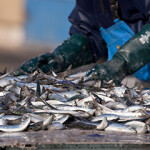Selective breeding program in Kenya develops improved high-yield Nile tilapia strain

The government-run Kenya Marine & Fisheries Research Institute (KMFRI) has developed a genetically improved Nile tilapia strain through a selective breeding program, touting the new breed’s faster growth rate, higher body weight, and ability to resist disease and withstand certain effects of climate change compared to previous strains.
The new Nile tilapia strain (Oreochromis niloticus), according to the institute, allows Kenya’s commercial fish farmers to bolster the production of quality fingerlings, increase national aquaculture output, and help the country balance its fish import-export ratio by producing more high-quality products domestically.
“This improved strain will substantially increase fish production and productivity, positively impacting fish farmers’ livelihoods when supplied to the farmers and seed multipliers,” KMFRI Researcher Jacob Abwao said.
In Kenya, fish production, on average, totals 165,000 metric tons (MT) annually – far below the estimated nationwide demand of 475,000 MT Nile tilapia comprises 80 percent of the fish farming in Kenya.
That deficit of 310,000 MT has created profitable openings for China and other leading ...
Photo courtesy of Lake Harvest Group




Share